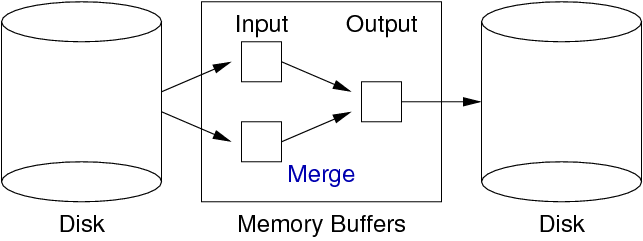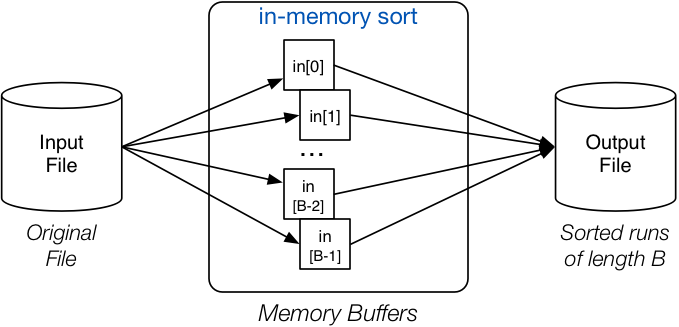Sorting
Two-way Merge Sort
For large data on disks, external sorts are needed.

Requires at least 3 buffers:

Cost of Two-way Merge Sort
For a file containing b data pages:
- Require
ceil(log_2(b))passes to sort. - Each pass requires
bpage reads,bpage writes. - Gives total cost:
2 * b * ceil(log_2(b)).
n-way Merge Sort
Initial pass uses B total buffers. B pages are read at a time, sorted and then written back to memory. Creates a sorted run of length B pages.

Merge passes uses b = B - 1 input buffers, 1 output buffer.

Method:
// Produce B-page-long runs
for each group of B pages in Rel {
read B pages into memory buffers
sort group in memory
write B pages out to Temp
}
// Merge runs until everything sorted
numberOfRuns = ceil(b/B)
while (numberOfRuns > 1) {
// n-way merge, where n=B-1
for each group of n runs in Temp {
merge into a single run via input buffers
write run to newTemp via output buffer
}
numberOfRuns = ceil(numberOfRuns/n)
Temp = newTemp // swap input/output files
}
Cost of n-Way Merge Sort
Consider file where b = 4096 pages and B = 16 total buffers:
- Pass 0:
- Produces 256 * 16-page sorted runs.
- Pass 1:
- Performs 15-way merge of groups of 16-page sorted runs.
- Produces 18 * 240-page sorted runs (17 full runs, 1 short run).
- Pass 2:
- Performs 15-way merge of groups of 240-page sorted runs.
- Produces 2 * 3600-page sorted runs (1 full run, 1 short run).
- Pass 3:
- Performs 15-way merge of groups of 3600-page sorted runs.
- Products 1 * 4096 page sorted runs.
Generalizing using b data pages and B buffers:
- First pass: read/write
bpages, givesb_0 = ceil(b / B)runs. - Then need
ceil(log_n(b_0))passes until sorted, wheren = B - 1. - Each pass reads and writes
bpages. - Total cost:
2 * b * (1 + ceil(log_n(b_0))).
Sorting in PostgreSQL
PostgreSQL uses a similar merge sort to above.
Tuples are mapped to SortTuple structs for sorting:
- Containing pointer to tuple and sort key.
- No need to reference actual Tuples during sort.
- Unless multiple attributes used in sort.
If all data fits in memory, sort using qsort().
If memory fills while reading, form “runs” and do disk-based sort.
Disk-based sort has phases:
- Divide input into sorted runs using HeapSort.
- Merge using
Nbuffers, one output buffer. N= as many buffers asworkMemallows.
Sorting comparison operators are obtained via catalog:
// gets pointer to function via pg_operator
struct Tuplesortstate { ... SortTupleComparator ... };
// returns negative, zero, positive
ApplySortComparator(Datum datum1, bool isnull1,
Datum datum2, bool isnull2,
SortSupport sort_helper);